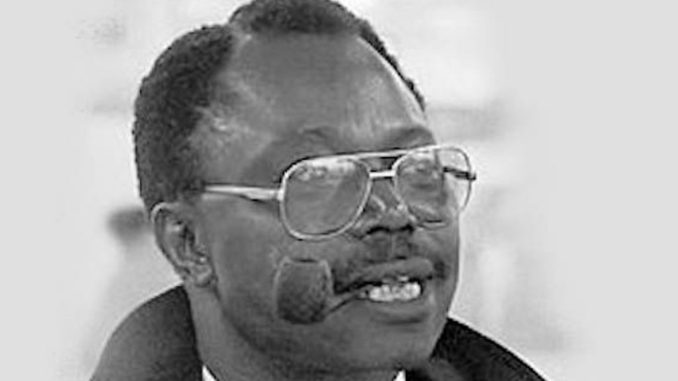
Professor Adedeji laboured with others towards building independent economic growth and development in Africa. He challenged the Bretton Woods orthodoxies, and provided the African alternative to the Western push for structural adjustment programmes. He gave great intellectual hope in Africa, as Deng Tsiao Ping had led on the transformation of China.
Professor Adebayo Adedeji, the quintessential development expert who held sway at the United Nations Economic Commission for Africa (UNECA) died on the night of April 25, 2018 in Lagos. Before his stint at the United Nations, he had played a highly significant role in post civil war reconstruction in Nigeria, as well as in development planning for the entire country, as federal commissioner for economic and development planning.
His death marks the end of a great era for Africa, as the epitome of the push for continental integration. His intellectual and physical efforts resulted in the formation of the Economic Commission of West African States (ECOWAS), in spite of the French effort to award the status of father of that institution to someone else.
Little known to the African public at large, was the role Adedeji played with respect to the decolonisation of Southern Africa, in general, and the struggle against apartheid in South Africa, in particular. As a man of integrity, he became a trusted conduit of funds and materiel to freedom fighters. For instance, from Siad Barre of Somalia and others, he delivered goodies for the onslaught against Rhodesia to Robert Mugabe in the bushes of Zambia.
Professor Adedeji laboured with others towards building independent economic growth and development in Africa. He challenged the Bretton Woods orthodoxies, and provided the African alternative to the Western push for structural adjustment programmes. He gave great intellectual hope in Africa, as Deng Tsiao Ping had led on the transformation of China.
Unfortunately, a dependent globalisation order under corrupt leaders in Africa continues to radically chip away from the great efforts of the 1980s that Adebayo Adedeji had led.
In retirement from the UN, he continued writing and was recognised as one of the world’s best 50 minds on economic development. He equally played a significant role in pushing the African Union Peer Review Mechanism forward, as well as the first effort at AU Reforms.
He was persuaded to retire from the United Nations system and lead Nigeria, as Babangida pretended that he really wanted to leave office. Not only did Babangida have no intention of leaving office, the Nigerian electorate, under the hold of decadent elites, never supported people with ideas for office. His quest for the Nigerian presidency was a still-birth.
In retirement from the UN, he continued writing and was recognised as one of the world’s best 50 minds on economic development. He equally played a significant role in pushing the African Union Peer Review Mechanism forward, as well as the first effort at AU Reforms.
Locally, he served his community as Asiwaju of Ijebuland, among other responsibilities, in collaboration with Awujale, the paramount king of the Ijebus. A good number of times, he tagged me along to the palace, especially during the annual colourful Ojude-Oba festival.
Professor Adedeji had planned his retirement into Ijebu-Ode. Over time he had built the African Centre for Development and Strategic Studies (ACDESS), which was opened with a lot of gusto involving several serving African heads of state and government, with the revered Mwalimu Julius Nyerere in attendance. ACDESS put out a significant volume on Africa annually, with scholars and practitioners providing knowledge on how to handle the problems in many African countries. I joined others in contributing two chapters on Somalia and Kenya to The Monitor‘s 2006 edition devoted to “Africa: Conflict, Peace and Governance.”
With demands on his time all over Africa, nay the world, the institutionalisation of ACDESS suffered. On his 80th birthday in 2010, attended by a number of former presidents, the effort geared towards the revitalisation of ACDESS was too feeble. A clear succession plan was not realised. Howevever, the late Professor Adedeji did his part. Others can move ACDESS forward to achieve his dreams of a roundedly developed Africa.
Babafemi Badejo wrote from Lagos.
END

Be the first to comment